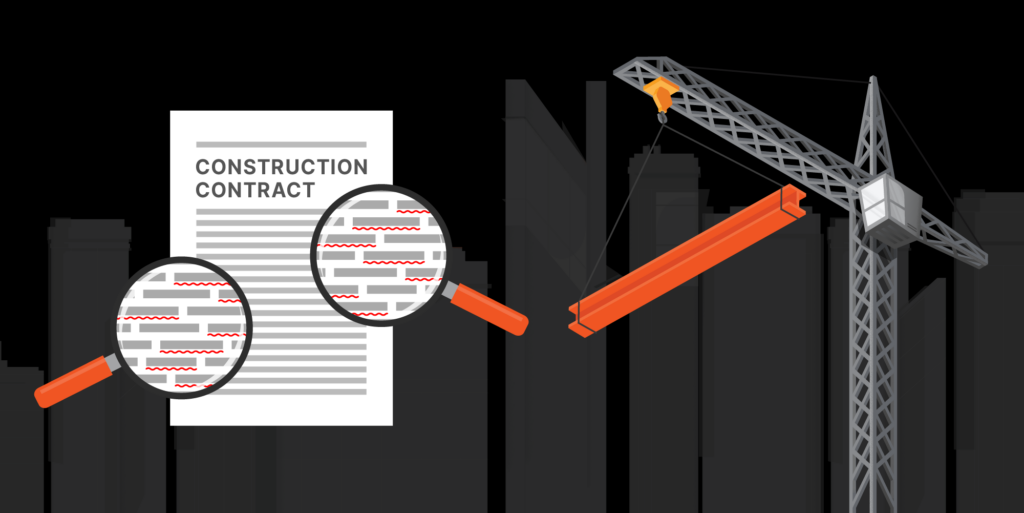— 8 min read
Time and Materials vs. Fixed Fee Contracts: Pros, Cons & Choosing the Right Fit


Last Updated Sep 6, 2024

Teresa Buturusis
Senior Strategic Product Consultant, General Contractors
Teresa is a Senior Strategic Product Consultant at Procore. She has almost 20 years of experience in construction finance, working for large general contractors like Alberici Constructors. Teresa has an MBA from University of Illinois Urbana-Champaign.

Matt King
Author
Matt King is a professional writer whose work has appeared in The Village Voice and The American Lawyer, as well as on PBS FRONTLINE. He holds an M.S. in journalism from Columbia University, and a J.D. from Northeastern University's School of Law. In his office hangs a medal from the Brooklyn Pinball Championship (on the back it says participant).
Last Updated Sep 6, 2024

In construction, managing projects efficiently while also ensuring financial stability is a delicate balance. Project owners are searching for the best quality work, performed in the shortest amount of time, for the least amount of money — while contractors are forever seeking predictability and profit maximization. So how is this balance struck? Well, as with so many things in the industry, it all comes back to the contract.
Though many contractual arrangements exist in the construction trade, two common contracts for projects are fixed fee and time and materials. This article will define and contrast these types of contracts, as well as lay out the advantages and disadvantages of each for both project owners and contractors.
Table of contents
Fixed Fee Contracts
Fixed fee contracts — also referred to as lump sum contracts — operate exactly as one might imagine: An owner and a general contractor negotiate for a fixed, flat fee to perform a specific construction project. This fee includes all aspects of the project — including labor, materials, markup and contingency costs.
A fixed fee contract is easy to understand, but can be risky for general contractors who are not able to properly predict a project’s total cost and/or scope. However, should a project’s scope and/or cost change substantially for reasons outside the contractor’s control, a change order can be agreed upon by both the owner and the contractor, thereby officially altering the scope (and the cost) of the project.
A fixed fee contract offers a contractor significant upside — as long as that contractor is able to properly assess the scope of work at a project’s outset.
Time and Materials Contracts
A time and materials contract is an agreement between a contractor and an owner in which both parties agree that the contractor will be reimbursed by the owner for materials used on a construction project, along with the contractor being paid a specific hourly rate for labor, all including a predetermined markup for profit.
A time and materials contract involves more complex recordkeeping than a fixed fee contract, but offers more security to a general contractor, as they can depend on being paid for whatever work and material requirements may arise on a project.
Margins are typically lower under time and materials contracts, but are more predictable than Fixed Fee contracts.
Fixed Fee Advantages
A fixed fee contract has advantages to offer, for both owners and contractors alike.
Advantages for Owners
Simplicity
Fixed fee contracts are some of the easiest contracts to understand. The contract will clearly state the specifics of the work to be performed, and the total sum that will be paid for that work.
Predictable budgeting
As both parties agree from the start what the total cost of the project (barring any change orders) is to be, project budgeting is straightforward.
Ease of Financing
Likewise, because the project's total cost is clear from the beginning, owners may find it less challenging to secure financing for that project — lenders can easily assess how much must be outlaid for the project’s completion.
Advantages for Contractors
Profit Potential
With total compensation agreed to upfront, contractors who are able to deliver quality results in less time have the possibility for large profit margins.
However, this potential upside depends on the contractor’s ability to accurately assess the amount of work required for the project, and on their own ability to execute on that work. Exceptional project management is crucial under a fiixed fee contract.
Less Documentation & Bureaucracy
Because compensation isn’t tied to the number of hours worked on a project, there are fewer bureaucratic requirements under a Fixed Fee contract – Freeing the contractor from (often onerous) paperwork demands.
Fixed Fee Disadvantages
Though there are significant upsides to fixed fee contracts, they do present a few drawbacks as well.
Disadvantages for Owners
Longer Negotiations
When drawn up optimally, fixed fee contracts will detail all aspects of work to be performed by the contractor – meaning negotiations can become protracted, as the parties work out (and specifically define) the project’s scope within the contract.
Quality of Work
Because contractors are looking to work as quickly (and as cheaply) as possible under a fixed fee contract, a latent incentivization for sub-quality performance does exist.
This incentivization can be offset by any number of means, including regular inspection by the owner, requiring the contractor to agree to retainage, and/or asking the contractor to post a performance bond.
Unexpected Changes
When unexpected changes become necessary under a fixed fee contract, owners are then on the hook for additional (and often substantial) costs. It is important that owners properly assess the nature of a project before agreeing to a fixed fee contract.
Disadvantages for Contractors
Inaccurate Forecasting
A contractor’s success under a fixed fee contract turns on that contractor’s ability to forecast accurately – if the contractor underestimates the amount of work or materials required for a project, that contractor will see their profit margins evaporate.
Worse, if the contractor finds themselves unable to perform on the contract, a claim can be made against their bond, affecting the contractor’s ability to secure future work. In extreme cases non-performance can even force bankruptcy.
Scope Disputes
Likewise,fixed fee contracts can lead to disputes of scope between the contractor and the owner — with the owner pressing for more work from the contractor without an attendant increase in fee.
When agreeing to a fixed fee contract it is paramount that contractual language describes the project’s scope. This language should be specific, so that contractors can feel secure in knowing exactly how much work it is that they are agreeing to.
Time and Materials Advantages
As with fixed fee contracts, time and materials contracts offer distinct advantages for both parties.
Advantages for Owners
Breaking Ground Faster
Because all that this required for a time and materials contract is for the parties to agree to the rates that will be paid for labor and materials (as opposed to detailing the specifics of the work to be performed), negotiations between the contractor and owner are often speedier than a Fixed Fee contract — meaning work can begin more quickly.
Flexibility
Time and materials contracts offer owners significant flexibility, allowing for easy changes to a project’s scope and direction. Time and Materials contracts can adapt when the project does.
Transparency
Throughout the project the contractor will continuously provide the owner with detailed information about the work being performed – As is required for compensation under a Time and Materials contract. Because of this regular reporting, the owner will stay closely informed on the status of the project.
Advantages for Contractors
Security
For contractors, time and materials contracts offer both predictability and security. Contractors know exactly the profit margin they will enjoy for each unit of work performed on a project and do not have to concern themselves with arguments over scope.
Decreased Preconstruction Burden
Time and materials contracts require less of contractors prior to beginning on a job. Because compensation isn’t tied to specific performance, contractors can spend less time assessing and defining the future work.
Time and Materials Disadvantages
Again, there are reasons contractors and owners may prefer a different contractual structure to time and materials.
Disadvantages for Owners
Open-Ended Budgeting
Without an upfront total cost for the project, owners can be exposed to financial risk, if and when the scope of the project begins to sprawl.
This risk can be limited somewhat by including a “Not-to-Exceed” clause in the contact – Basically an upper limit to the amount an owner will pay out under a time and materials contract.
Efficiency Disincentivization
Under a time and materials contract, in which a contractor’s compensation and profit are tied to the total number of hours the contractor works, a temptation exists to draw out a project – Spending more time than is necessary on each build phase, accruing to many excess hours worked over the life of a project.
Again, a Not-to-Exceed clause acts as a backstop against efficiency disincentivization – But, more than that, trust between owner and contractor is crucial on Time and Materials jobs.
Disadvantages for Contractors
Burdensome Cost Tracking
Detailed cost tracking is required on the part of the contractor, in order to ensure that all work and materials on a project are accounted for and submitted to the owner. This cost tracking can feel overwhelming for the uninitiated.
Managing expectations
Because compensation and profit are less tied to specific execution on a project, and because scope can change, evolve or even be unknown with a time and materials contract, managing owners’ expectations can be difficult for contractors.
Again, clear and consistent communication is vital when working under a time and materials contract.
Scope: The Contractual Compass
While keeping in mind the advantages and disadvantages of each type of contract, an additional (and crucial) factor that must be considered when choosing between a fixed fee and a time and materials contract is the scope of the specific project.
A fixed fee contract is typically best suited to a project with a clear and definable scope – A design-build for a new home on an established lot, for example. A time and materials contract, on the other hand, will often be utilized when scope is less or even entirely unknown – such as remediation after a natural disaster.
When choosing between these two common types of construction contracts, owners and contractors alike must consider the specific project at issue in order to avoid disputes once work has begun.
Was this article helpful?
Thank you for your submission.
100%
0%
You voted that this article was . Was this a mistake? If so, change your vote
Scroll less, learn more about construction.
Subscribe to The Blueprint, Procore’s construction newsletter, to get content from industry experts delivered straight to your inbox.
By clicking this button, you agree to our Privacy Notice and Terms of Service.
Thank you!
You’re signed up to receive The Blueprint newsletter from Procore. You can unsubscribe at any time.
Categories:
Written by

Teresa Buturusis
Senior Strategic Product Consultant, General Contractors
Teresa is a Senior Strategic Product Consultant at Procore. She has almost 20 years of experience in construction finance, working for large general contractors like Alberici Constructors. Teresa has an MBA from University of Illinois Urbana-Champaign.
View profile
Matt King
Author
Matt King is a professional writer whose work has appeared in The Village Voice and The American Lawyer, as well as on PBS FRONTLINE. He holds an M.S. in journalism from Columbia University, and a J.D. from Northeastern University's School of Law. In his office hangs a medal from the Brooklyn Pinball Championship (on the back it says participant).
View profileExplore more helpful resources

Using Standard Operating Procedures for Better Contract Management
Every construction project is different, meaning that GCs have to be continually agile and strategic about applying their experience. Major categories change from project to project, from the owner to...

Understanding Supplementary Conditions on Construction Contracts
No two construction projects are exactly alike — and the same goes for construction contracts. Even when using a standard contract form, owners and contractors sometimes use supplementary conditions to...

A Straightforward Guide to Construction Contract Review
Construction contracts are like the glue for the project team. They’re the ties that bind the working relationships and goals for the project, containing information about responsibilities, liabilities and processes...

Escalation Clauses in Construction Contracts: When and How They Apply
In construction contracts, an escalation clause allows for the escalation of a certain price for labor or materials to be used in a construction project. This type of clause is most...
Free Tools
Calculators
Use our calculators to estimate the cost of construction materials for your next project.
Templates
Find a template to help you with your construction project tasks.
Material Price Tracker
Get the latest U.S. retail prices and view historical trends for common building materials.
Glossary
Explore key terms and phrases used in the industry.
